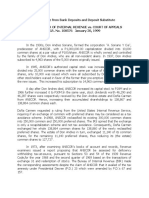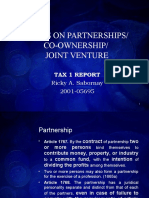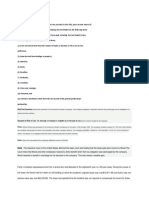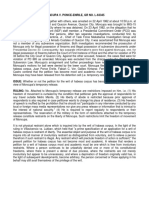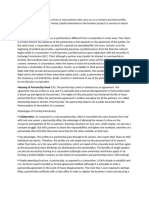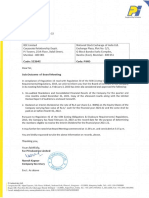Wise v. Meer
Wise v. Meer
Uploaded by
Sosthenes Arnold MierCopyright:
Available Formats
Wise v. Meer
Wise v. Meer
Uploaded by
Sosthenes Arnold MierCopyright
Available Formats
Share this document
Did you find this document useful?
Is this content inappropriate?
Copyright:
Available Formats
Wise v. Meer
Wise v. Meer
Uploaded by
Sosthenes Arnold MierCopyright:
Available Formats
said amounts which defendant has refused and
Wise & Co., Inc. v. Meer GR NO: 48231 (1947) still refuses to refund.
FACTS: That during the year 1937, plaintiffs, CONTENTIONS:
except Mr. E.M.G. Strickland (who, as husband CIR-The amounts received by Wise & Co et al
of the plaintiff Mrs. E.M.G. Strickland, is only a from the HK Company were liquidating
nominal party herein), were stockholders of dividends (thus, subject to normal tax)
Manila Wine Merchants, Ltd., a foreign
corporation duly authorized to do business in the Wise & Co et al say- The amounts were ordinary
Philippines. dividends
That on May 27, 1937, the Board of Directors of ISSUES:
Manila Wine Merchants, Ltd., (hereinafter
referred to as the Hongkong Company), 1. WON the amounts received by Wise &
recommended to the stockholders of the Co et al from the HK Company on which
company that they adopt the resolutions the taxes were assessed were ordinary
necessary to enable the company to sell its dividends or liquidating
business and assets to Manila Wine Merchants, dividends (LIQUIDATING DIVIDENDS)
Inc., a Philippine corporation formed on May 27,
1937, (hereinafter referred to as the Manila 2. WON such liquidating dividends are
Company), for the sum of P400,000; taxable income (YES)
HK Company made a distribution of its earnings
for the year 1937 to its stockholders (Dividends RULING:
declared and paid on June 8, 1937). HK 1. The amounts received by the
Company paid Philippine income tax on the stockholders were liquidating
entire earnings from which the said distributions dividends.
were paid.
The parties agreed in the deed of sale that the
After the June 8 distribution, HK Company had : sale and transfer shall take effect as of June 1,
P74, 182 – surplus resulting from the active 1937. Thus, the distribution of assets to the
conduct of business stockholders made after that date must have
P270, 116 – total increased surplus as a result been considered by them as liquidating
of the sale of the business and assets dividends. The said distributions were NOT in
the ordinary course of business and with intent
The stockholders by proper resolution directed to maintain the corporation as a going concern
that the company be voluntarily liquidated and (in which case they would be ordinary dividends)
its capital distributed among the stockholders; BUT they were made after the liquidated of the
that the stockholders at such meeting appointed business had been decided upon, which makes
a liquidator duly paid off the remaining debts of them payments for the surrender and
the Hongkong Company and distributed its relinquishment of the stockholder’s interest in
capital among the stockholders including the corporation, or liquidating dividends.
plaintiffs; that the liquidator duly filed his Ordinary connotation of liquidating dividend
accounting on January 12, 1938, and in involves the distribution of assets by a
accordance with the provisions of Hongkong corporation to its stockholders upon dissolution.
Law, the Hongkong Company was duly
dissolved at the expiration of three moths from •Wise & Co et al (stockholders) say: It was only
that date. on August 19, 1937, that the HK Company took
the first corporate steps towards liquidation.
That plaintiff duly filed Philippine income tax
returns. That defendant subsequently made the RULING: It was expressly stipulated in the
deficiency assessments. That said plaintiffs duly formal deed of sale (see underlined portion in
paid the said amounts demanded by defendant facts) that the sale or transfer shall take effect
under written protest, which was overruled in on June 1, 1937. After that date, and until
due course; that the plaintiffs have since July 1, completion of the transfer, the HK Company
1939 requested from defendant a refund of the
continued to run the business in trust for the new
owner, the Manila Company. •That money in the hands of the corporation
•The determining element is whether the formed a part of its income and was properly
distribution was in the ordinary course of taxable to it under the Income Tax Law.
business and with intent to maintain the
corporation as a going concern, or after deciding •When the corporation was dissolved and in
to quit with intent to liquidate the business. process of complete liquidation and its
•The fact that the distributions were called shareholders surrendered their stock to it and it
‘dividends’ and were made, in part, from paid the sums in question to them in exchange,
earnings and profits, and that some of them a transaction took place.
were made before liquidation or dissolution
proceedings were commenced, is NOT •The shareholder who received the
controlling. consideration for the stock earned that much
money as income of his own, which again was
Liquidating dividend v Ordinary dividend properly taxable to him under the Income Tax
Law.
• The distinction between a distribution
in liquidation and an ordinary dividend is factual; The profits earned by the stockholders are
the result in each case depending on the income from Philippine sources, and thus
particular circumstances of the case and the subject to Philippine tax
intent of the parties.
• If the distribution is in the nature of a Stockholders say: the profit realized by them
recurring return on stock it is an ordinary does not constitute income from Philippine
dividend. sources and is not subject to Philippine taxes
• However, if the corporation is really since all steps in the carrying out of this so-
winding up its business or recapitalizing and called sale took place outside the Philippines
narrowing its activities, the distribution may
properly be treated as in complete or partial SC:
liquidation and as payment by the corporation to •The HK Company was at the time of the sale of
the stockholder for his stock. The corporation is, its business in the Philippines, and the Manila
in the latter instances, wiping out all parts of the Company was a domestic corporation domiciled
stockholders' interest in the company . . .. “ and doing business also in the Philippines.
•The HK Company was incorporated for the
2. Such liquidating dividends are purpose of carrying on business in the
taxable income Philippines which is the business of wine, beer,
and spirit merchants and the other objects set
•Income tax law states that: “Where a out in its memorandum of association.
corporation, partnership, association, joint-
account, or insurance company distributes all of •Hence, its earnings, profits, and assets,
its assets in complete liquidation or dissolution, including those from whose proceeds the
the gain realized or loss sustained by the distributions in question were made, the major
stockholder, whether individual or corporation, is part of which consisted in the purchase price of
a taxable income or a deductible loss as the thebusiness, had been earned and acquired in
case may be.” the Philippines.
•Amounts distributed in the liquidation of a •As such, it is clear that said distributions were
corporation shall be treated as payments in income "from Philippine sources."
exchange for the stock or share, and any gain or
profit realized thereby shall be taxed to the Judgment affirmed.
distributee as other gains or profits.
DISPOSITIVE PORTION: For the foregoing
•The stockholders received the distributions in consideration, the judgment appealed from will
question in exchange for the surrender and be affirmed with the costs of both instances
relinquishment by them of their stock in the HK against the appellants. So ordered.
Company which was dissolved and in process of
complete liquidation.
You might also like
- Stripe Tax Invoice 64CH8TWL-2023-10Document1 pageStripe Tax Invoice 64CH8TWL-2023-10Fabiano LealNo ratings yet
- Summary of William H. Pike & Patrick C. Gregory's Why Stocks Go Up and DownFrom EverandSummary of William H. Pike & Patrick C. Gregory's Why Stocks Go Up and DownNo ratings yet
- 11-09 MscaDocument32 pages11-09 MscaRNo ratings yet
- 208 Wise V MeerDocument1 page208 Wise V Meeragnes13No ratings yet
- Taxation Case Summaries - 3-Manresa 2018-2019: Distribution of Dividends or Assets by Corporations.Document2 pagesTaxation Case Summaries - 3-Manresa 2018-2019: Distribution of Dividends or Assets by Corporations.Ergel Mae Encarnacion RosalNo ratings yet
- Wise Vs MeerDocument2 pagesWise Vs MeerSalma GurarNo ratings yet
- 10 Wise Co v. MeerDocument2 pages10 Wise Co v. MeerkresnieanneNo ratings yet
- Wise and Co., Inc. Vs Meer G.R. NO. 48231 JUNE 30, 1947 Ponente: Hilado, J. Case Digest By: Luzadio, Loury Mae MDocument2 pagesWise and Co., Inc. Vs Meer G.R. NO. 48231 JUNE 30, 1947 Ponente: Hilado, J. Case Digest By: Luzadio, Loury Mae MLoury Luzadio100% (2)
- Going Concern, Distributed Ordinary Dividends To Them ThereafterDocument25 pagesGoing Concern, Distributed Ordinary Dividends To Them ThereafterjNo ratings yet
- L-48231 Wise & Co V MeerDocument18 pagesL-48231 Wise & Co V Meersteth16No ratings yet
- Wise & Co., Inc. v. Meer (30 June 1947)Document31 pagesWise & Co., Inc. v. Meer (30 June 1947)KTNo ratings yet
- CIR V Soriano DigestDocument4 pagesCIR V Soriano DigestKristian AguilarNo ratings yet
- Cases For February 15Document29 pagesCases For February 15PJANo ratings yet
- Marubeni Corporation v. Commissioner of Internal Revenue, G.R. No. 76573, 14 September 1989Document27 pagesMarubeni Corporation v. Commissioner of Internal Revenue, G.R. No. 76573, 14 September 1989Shiela MarieNo ratings yet
- Cir V RufinoDocument3 pagesCir V Rufinochrissamagat100% (1)
- Wise & Co., Inc. v. Meer (June 30, 1947)Document13 pagesWise & Co., Inc. v. Meer (June 30, 1947)Crizza RondinaNo ratings yet
- CIR vs. CA and ANSCORDocument4 pagesCIR vs. CA and ANSCORI took her to my penthouse and i freaked itNo ratings yet
- CIR Vs Soriano TAX DigestDocument3 pagesCIR Vs Soriano TAX DigestGeorge PandaNo ratings yet
- CIR VS CA-OstiqueDocument5 pagesCIR VS CA-OstiquePSYCHE SHYNE OSTIQUENo ratings yet
- Tax Review DoctrinesDocument18 pagesTax Review DoctrinesGrace Robes HicbanNo ratings yet
- TAX Income Tax DigestDocument63 pagesTAX Income Tax DigestbcarNo ratings yet
- WISE and CO V Meer DigestDocument1 pageWISE and CO V Meer DigestKTNo ratings yet
- Digested Cases in Tax 1Document35 pagesDigested Cases in Tax 1Rj FonacierNo ratings yet
- ACCOUNTING FOR CORPORATIONS-Retained EarningsDocument53 pagesACCOUNTING FOR CORPORATIONS-Retained EarningsMarriel Fate Cullano100% (3)
- Wise and CoDocument17 pagesWise and CoXeem LeenNo ratings yet
- CalasanzDocument8 pagesCalasanzGenesis LealNo ratings yet
- CIR V CA (GR 108576)Document2 pagesCIR V CA (GR 108576)Florence Uda100% (4)
- Cir V ManningDocument12 pagesCir V Manningnia_artemis3414No ratings yet
- Taxation Law I Case Digests 2Document45 pagesTaxation Law I Case Digests 2Christopher G. Halnin75% (4)
- Cir vs. CA, Soriano CorpDocument3 pagesCir vs. CA, Soriano CorpkarlonovNo ratings yet
- Tax 2 Digest (0406) GR 108576 012099 Cir Vs CaDocument3 pagesTax 2 Digest (0406) GR 108576 012099 Cir Vs CaAudrey Deguzman100% (1)
- University of The Philippines College of Law: HDD 4DDocument3 pagesUniversity of The Philippines College of Law: HDD 4DYunhosshi DisomangcopNo ratings yet
- Perez Cir vs. CaDocument2 pagesPerez Cir vs. CaAllenNo ratings yet
- Wise and CoDocument4 pagesWise and CoJesse Joe LagonNo ratings yet
- Redemption of Shares of StockDocument3 pagesRedemption of Shares of StockErlene CompraNo ratings yet
- Cases JloDocument10 pagesCases JloOwen DefuntaronNo ratings yet
- CorpTax ModuleDocument20 pagesCorpTax ModuleRovi IgoyNo ratings yet
- 107 108 112 Fisher V TrinidadDocument4 pages107 108 112 Fisher V TrinidadBeata CarolinoNo ratings yet
- Income Taxation Case Digests Donalvo 2016 v02 COMPLETEDocument24 pagesIncome Taxation Case Digests Donalvo 2016 v02 COMPLETESanchez RomanNo ratings yet
- Partnership TaxationDocument6 pagesPartnership TaxationAndrew LastrolloNo ratings yet
- University of The Philippines College of Law: Case Name Topic Case No. - Date PonenteDocument5 pagesUniversity of The Philippines College of Law: Case Name Topic Case No. - Date PonenteJB GuevarraNo ratings yet
- Types of Dividends and Other Distributions Nielson & Co. Inc. vs. Lepanto Consolidated Mining Co. (GR. No. L-21601 December 28, 1968)Document17 pagesTypes of Dividends and Other Distributions Nielson & Co. Inc. vs. Lepanto Consolidated Mining Co. (GR. No. L-21601 December 28, 1968)Gabe BedanaNo ratings yet
- Cases On Partnerships/ Co-Ownership/ Joint Venture: Tax 1 ReportDocument40 pagesCases On Partnerships/ Co-Ownership/ Joint Venture: Tax 1 ReportNaomi CorpuzNo ratings yet
- Income TaxationDocument77 pagesIncome TaxationDyl SorongonNo ratings yet
- Commissioner of Internal Revenue v. ManningDocument11 pagesCommissioner of Internal Revenue v. ManningdinnNo ratings yet
- CH 2 - Group Financial StatmentDocument47 pagesCH 2 - Group Financial StatmentWedaje AlemayehuNo ratings yet
- TaxxxxDocument3 pagesTaxxxxGlaiza CelNo ratings yet
- McLaranv CrescentPlanningMillDocument4 pagesMcLaranv CrescentPlanningMillkitakatttNo ratings yet
- Capital GainsDocument5 pagesCapital Gainsotengbenjamin2020No ratings yet
- Chapter 6 TaxDocument17 pagesChapter 6 TaxAngelika OlarteNo ratings yet
- Cojuanco Vs SandiganbayanDocument20 pagesCojuanco Vs SandiganbayansirynspixeNo ratings yet
- GNotes Income Tax 100814 Part1Document42 pagesGNotes Income Tax 100814 Part1Migz DimayacyacNo ratings yet
- Held. The Supreme Court of The United States Affirmed The Lower Court and Holding That The Taxes Paid Were Income To Wood - TheDocument3 pagesHeld. The Supreme Court of The United States Affirmed The Lower Court and Holding That The Taxes Paid Were Income To Wood - TheDudzLajaratoNo ratings yet
- Burk v. Ottawa GasDocument1 pageBurk v. Ottawa GasjustinegalangNo ratings yet
- Fisher v. Trinidad (43 Phil 973) : Stock: Income TaxationDocument48 pagesFisher v. Trinidad (43 Phil 973) : Stock: Income TaxationCassey Koi Farm0% (1)
- Accounting For Business For Business CombinationDocument5 pagesAccounting For Business For Business CombinationCharleene GutierrezNo ratings yet
- CIR v. CADocument2 pagesCIR v. CALynne SanchezNo ratings yet
- CIR V CA, CTA and A. Soriano CorpDocument1 pageCIR V CA, CTA and A. Soriano Corpearl0917100% (2)
- Income Taxation GeneralDocument37 pagesIncome Taxation GeneralEllen Glae DaquipilNo ratings yet
- 1040 Exam Prep Module III: Items Excluded from Gross IncomeFrom Everand1040 Exam Prep Module III: Items Excluded from Gross IncomeRating: 1 out of 5 stars1/5 (1)
- Dividend Growth Investing: A Step-by-Step Guide to Building a Dividend Portfolio for Early RetirementFrom EverandDividend Growth Investing: A Step-by-Step Guide to Building a Dividend Portfolio for Early RetirementRating: 4 out of 5 stars4/5 (1)
- Nestle vs. Puregold Price Club, IncDocument2 pagesNestle vs. Puregold Price Club, IncSosthenes Arnold Mier100% (1)
- Facts:: CITIGROUP, INC., Petitioner, v. CITYSTATE SAVINGS BANK, INC. RespondentDocument2 pagesFacts:: CITIGROUP, INC., Petitioner, v. CITYSTATE SAVINGS BANK, INC. RespondentSosthenes Arnold MierNo ratings yet
- Set 2 Crim Rev CasesDocument64 pagesSet 2 Crim Rev CasesSosthenes Arnold MierNo ratings yet
- Mang Inasal Phils, Inc Vs IFP MFTG Corp GR No. 221717 June 19, 2017Document1 pageMang Inasal Phils, Inc Vs IFP MFTG Corp GR No. 221717 June 19, 2017Sosthenes Arnold MierNo ratings yet
- Gatchalian v. CollectorDocument6 pagesGatchalian v. CollectorSosthenes Arnold MierNo ratings yet
- CORPUZ vs. Sto. TomasDocument2 pagesCORPUZ vs. Sto. TomasSosthenes Arnold MierNo ratings yet
- Justice ScaliaDocument27 pagesJustice ScaliaSosthenes Arnold MierNo ratings yet
- CIR v. DLSUDocument14 pagesCIR v. DLSUSosthenes Arnold MierNo ratings yet
- PALE CasesDocument258 pagesPALE CasesSosthenes Arnold MierNo ratings yet
- Yutivo DigestDocument1 pageYutivo DigestSosthenes Arnold MierNo ratings yet
- Ramnani v. CIRDocument23 pagesRamnani v. CIRSosthenes Arnold MierNo ratings yet
- Heunghwa v. DJ BuildersDocument1 pageHeunghwa v. DJ BuildersSosthenes Arnold MierNo ratings yet
- Republic v. CA - Psychological IncapacityDocument5 pagesRepublic v. CA - Psychological IncapacitySosthenes Arnold MierNo ratings yet
- Moncupa v. Ponce-Enrile (Habeas Corpus)Document1 pageMoncupa v. Ponce-Enrile (Habeas Corpus)Sosthenes Arnold MierNo ratings yet
- Romualdez v. Tiglao & Ramos v. OrtuzarDocument2 pagesRomualdez v. Tiglao & Ramos v. OrtuzarSosthenes Arnold MierNo ratings yet
- STMT - Ent - Book - 2024-04-13T105936.526 22Document7 pagesSTMT - Ent - Book - 2024-04-13T105936.526 22mrsvariana954No ratings yet
- Curriculum Vitae: Norbert HelmkeDocument16 pagesCurriculum Vitae: Norbert HelmkeNorbert HelmkeNo ratings yet
- Sri Ramchandra Bhargav K-2Document3 pagesSri Ramchandra Bhargav K-2Bhargav SriramNo ratings yet
- Account STMT XX8258 12032024Document5 pagesAccount STMT XX8258 12032024adas27380No ratings yet
- Examination About Investment 21Document1 pageExamination About Investment 21BLACKPINKLisaRoseJisooJennieNo ratings yet
- Apple and Organizational Change - RGDocument13 pagesApple and Organizational Change - RGapi-457044339No ratings yet
- ESG Ratings and Indexes Are A Crucial Component of How Business Is Done in The TwentyDocument3 pagesESG Ratings and Indexes Are A Crucial Component of How Business Is Done in The TwentyShreya ChakrabortyNo ratings yet
- 1C710243106 DocDocument74 pages1C710243106 DocArun KumarNo ratings yet
- Accenture High Performance in Infrastructure and Construction OptDocument16 pagesAccenture High Performance in Infrastructure and Construction OptPreetham SamuelNo ratings yet
- Terms of Reference - Mentors: Criteria To Be A MentorDocument3 pagesTerms of Reference - Mentors: Criteria To Be A MentorProfit StreetNo ratings yet
- CHAPTER 1 An Overview of LogisticsDocument34 pagesCHAPTER 1 An Overview of Logisticsوائل مصطفىNo ratings yet
- A Partnership Is An Association of Two or More Persons Who Carry On As CoDocument4 pagesA Partnership Is An Association of Two or More Persons Who Carry On As Cojeffersonosorio951No ratings yet
- CDSG Internship Report (11.4.18)Document11 pagesCDSG Internship Report (11.4.18)NannSiwon PerayaNo ratings yet
- Pizza 4P'sDocument26 pagesPizza 4P'snguyen.simonNo ratings yet
- HR Case StudyDocument3 pagesHR Case Studyrajv880% (1)
- Grace Corp Audited FSDocument17 pagesGrace Corp Audited FSArchie Guevarra90% (10)
- Prelim Quiz - Business CombinationDocument4 pagesPrelim Quiz - Business CombinationJeane Mae BooNo ratings yet
- List of Shop Floor Control FAQ Notes - ERP Manufacturing (PP) - SCN WikiDocument1 pageList of Shop Floor Control FAQ Notes - ERP Manufacturing (PP) - SCN WikiSandeepNo ratings yet
- Notice: Indian Railway Catering and Tourism Corporation LimitedDocument10 pagesNotice: Indian Railway Catering and Tourism Corporation Limiteddigvijay singhNo ratings yet
- Piind Q3fy22Document10 pagesPiind Q3fy22Ranjan PrakashNo ratings yet
- All Subj - Board Exam-Picpa EeDocument9 pagesAll Subj - Board Exam-Picpa EeMJ YaconNo ratings yet
- Summer Internship Program Weekly Progress ReportDocument2 pagesSummer Internship Program Weekly Progress ReportanjaliNo ratings yet
- CV of Yogesh KapseDocument4 pagesCV of Yogesh Kapseharshadpatil133No ratings yet
- Sample Special ReportDocument17 pagesSample Special Reportroy ibanez jrNo ratings yet
- Ocean Carriers QuestionsDocument3 pagesOcean Carriers QuestionsAsif Al HyeNo ratings yet
- Innovation Management at 3MDocument22 pagesInnovation Management at 3MShreeya Shakya Risal100% (1)
- Accounting 12 Summative AdidasDocument57 pagesAccounting 12 Summative AdidasWensen LiNo ratings yet
- Oligopoly: Presented byDocument27 pagesOligopoly: Presented byJERRALYN ALVANo ratings yet


























